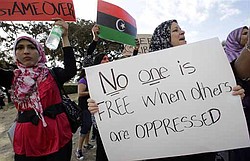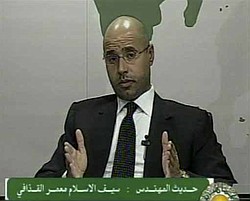Gadhafi’s son warns of civil war in Libya
AP
Libyan-American citizen Jamila Rashed, right, of Denton, Texas, holds a sign as she joins nearly 200 others during a rally at Dealey Plaza, Sunday, Feb. 20, 2011, in Dallas. Rashed said that she responded to a message on a social network site that called for the rally at the downtown Dallas plaza in support of a freedom in the country of Libya.
ASSOCIATED PRESS
In this video image broadcast on Libyan state television early Monday Feb. 21, 2011 Seif al-Islam, son of longtime Libyan leader Moammar Gadhafi, speaks. Al-Islam says protesters have seized control of some military bases and tanks, and also warned of civil war in the country that would burn its oil wealth.
Combined dispatches
CAIRO
After anti-government unrest spread to the Libyan capital and protesters seized military bases and weapons Sunday, Moammar Gadhafi’s son went on state television to proclaim that his father remained in charge with the army’s backing and would “fight until the last man, the last woman, the last bullet.”
Seif al-Islam Gadhafi, in the regime’s first comments on the six days of demonstrations, warned the protesters that they risked igniting a civil war in which Libya’s oil wealth “will be burned.”
The speech followed a fierce crackdown by security forces who fired on thousands of demonstrators and funeral marchers in the eastern city of Benghazi in a bloody cycle of violence that killed 60 people Sunday alone, according to a doctor in one city hospital. Since the six days of unrest began, more than 200 people have been killed, according to medical officials, human-rights groups and exiled dissidents.
Libya’s response has been the harshest of any Arab country that has been wracked by the protests that toppled long-serving leaders in neighboring Tunisia and Egypt. But Gadhafi’s son said his father would prevail.
“We are not Tunisia and Egypt,” he said. “Moammar Gadhafi, our leader, is leading the battle in Tripoli, and we are with him.”
Although the elder Gadhafi did not appear, his son often has been put forward as the regime’s face of reform.
Western countries have expressed concern at the rising violence against demonstrators in Libya. British Foreign Secretary William Hague said he spoke to Seif al-Islam by phone and told him that the country must embark on “dialogue and implement reforms,” the Foreign Office said.
In his speech, the younger Gadhafi conceded the army made some mistakes during the protests because the troops were not trained to deal with demonstrators.
He offered to put forward reforms within days that he described as a “historic national initiative” and said the regime was willing to remove some restrictions and begin discussions for a constitution. He offered to change a number of laws, including those covering the media and the penal code.
Protesters had seized some military bases, tanks and other weapons, he said, blaming Islamists, the media, thugs, drunks and drug abusers, foreigners — including Egyptians and Tunisians.
He also admitted that the unrest had spread to Tripoli.
The rebellion by Libyans frustrated with Gadhafi’s more than 40 years of authoritarian rule has spread to more than a half-dozen eastern cities — but also to Tripoli, where secret police were heavily deployed in the city of 2 million.
In Iran, meanwhile, thousands of opposition supporters clashed with club-wielding police in the capital of Tehran and other cities in protests against the Islamic regime, according to a human-rights group, witnesses and Internet videos and posts.
Pro-reform protests inspired by the popular uprisings in Egypt and Tunisia also took place in Morocco, Algeria, Iraq and Bahrain, where demonstrators maintained a peaceful occupation of the capital’s main square two days after dozens were killed and injured by troops firing live ammunition.
Protests also persisted in Yemen against the 30-year-rule of President Ali Abdullah Saleh, who said that he was ready for talks with the opposition on demands for constitutional reforms.
 43
43


